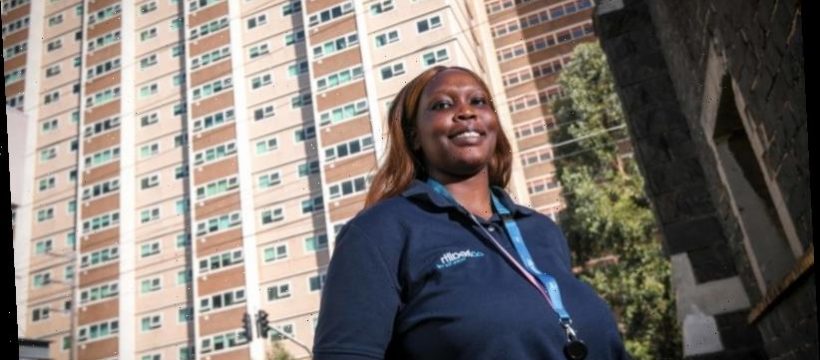Where do I get the vaccine? Can it make me sick? Is it safe? A team of public housing tower residents across Melbourne have been answering questions such as these to help their neighbours get the right information on COVID-19 shots.
Collingwood public housing resident Nikol Tap has been trained as a “health concierge”.Credit:Eddie Jim
Nikol Tap, 26, has been stationed about three times a week in the foyer of the Collingwood public housing estate – where she has lived for 14 years – to talk to people about COVID-19 and offer them face masks, hand sanitiser and information written in about a dozen languages.
“I’m a familiar face. When you see someone you know, you automatically establish trust with them,” Ms Tap said.
“It’s the difference between seeing a flyer and [Premier] Daniel Andrews on TV versus me physically right in front of you with a smile on my face.”
Ms Tap is one of 95 public housing residents who have been trained to be “health concierges” by community health provider Cohealth, in a campaign funded by the state government during the pandemic. Collectively, they speak 12 languages.
Since the vaccine rollout began, residents mostly want to know where to get vaccinated and how to book.
Others go to Ms Tap with their concerns: what the side effects of the shot are, whether the vaccine costs anything (it’s free), and how effective it is.
Residents mostly want to know where to get vaccinated and how to book.Credit:Eddie Jim
And she can offer them her first-hand experience as someone who has been tested for COVID-19 many times and who has now been vaccinated.
“We do have people who might have a concern about the vaccines and COVID,” Ms Tap said. “But then it’s like, ‘I’m a real human, I’m here and I’m speaking to you, letting you know what COVID is and what the vaccine is.’ ”
She said most people wanted to be vaccinated and it was valuable to speak candidly with neighbours at their doorsteps.
“Someone could just come down and say, ‘Hey, can you help me book? I don’t have internet, which number should I call?’ ”
Eligible public housing residents at the nearby North Richmond estate had been booked in for vaccinations, but The Age has confirmed a report in Guardian Australia that North Richmond Community Health was forced to cancel bookings while the residents waited for shots.
Mohammed Yassin, a Victorian multicultural commissioner and project leader at Spectrum, which connects migrants and refugees with services, said losing momentum could cause distrust.
“I can tell all the people who are eligible now to get the vaccination … But if they find it so difficult to be vaccinated, even though they are eligible, you’re breaking trust with the system,” he said.
In December, Ombudsman Deborah Glass found the Andrews government’s decision to put nine public housing towers into an immediate hard lockdown was not based on public health advice and probably breached residents’ human rights.
“The rushed lockdown was not compatible with the residents’ human rights, including their right to humane treatment when deprived of liberty,” Ms Glass said.
“In my opinion, based on the evidence gathered by the investigation, the action appeared to be contrary to the law.”
Melbourne GP Mukesh Haikerwal, the former president of the Australian Medical Association, said authorities had got better at engaging with communities since the beginning of the pandemic.
He has “very painful memories” from last year of families who were fearful of getting tested in case they returned a positive result, because they had not been properly communicated with.
In January, one-third of the 630 people surveyed in high-risk accommodation in Melbourne’s north and west told Cohealth they needed clearer information before getting vaccinated.
Professor Hassan Vally, an epidemiologist at La Trobe University, said information had to be provided by trusted people in a way that is accessible.
“It’s not just having the right messages, and having the messages delivered in a way that is understandable. But it’s who delivers the messages that is really important,” Professor Vally said.
He believes vaccine hesitancy – people with concerns but who are not “anti-vaxxers” – is more widespread than people realise.
“You can understand why people in this period of huge upheaval and so much uncertainty would have legitimate questions that they want answered around the vaccine.”
In a response late Sunday, the state government said it had invested $42 million into its high risk accommodation response program, which included the health concierge campaign.
“We’re working closely with CALD communities to ensure they have access to trusted and reliable information during the rollout of the Commonwealth’s coronavirus vaccination program,” a state government spokeswoman said.
Victoria’s COVID-19 hotline: 1800 675 398.
For information about Australia’s vaccines, visit the Department of Health website or call 1800 020 080. Translated information is here.
Start your day informed
Our Morning Edition newsletter is a curated guide to the most important and interesting stories, analysis and insights. Sign up here.
Most Viewed in National
From our partners
Source: Read Full Article


